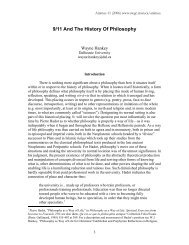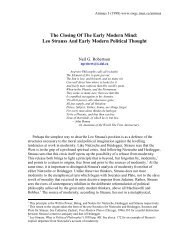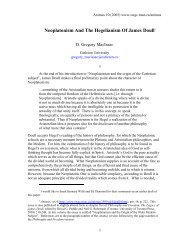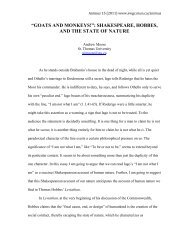Floy E Andrews, On Reading Philosophy after Analytic Philosophy.
Floy E Andrews, On Reading Philosophy after Analytic Philosophy.
Floy E Andrews, On Reading Philosophy after Analytic Philosophy.
Create successful ePaper yourself
Turn your PDF publications into a flip-book with our unique Google optimized e-Paper software.
ANDREWS: ON READING PHILOSOPHY AFTER ANALYTIC PHILOSOPHY<br />
universities have molded their institutions and formed their students to think that<br />
philosophy was analytic philosophy. If now it appears we may think otherwise, it would<br />
be rash to conclude that we are able to do so, that our minds are unfettered and free <strong>after</strong><br />
all those years of conformity to an essentially alien logic and a distorting reductionism.<br />
Before we turn again to the texts of our tradition, it would be wise to reflect on what has<br />
been endured, and what we might do to overcome the lingering effects of our ordeal.<br />
The early history of analytic philosophy is well enough known, its rise at the<br />
beginning of the century 6 , then the production of its logic and accompanying ontology 7 ,<br />
and as a further development the emergence of logical positivism. 8 The subsequent<br />
history is of the division in the movement itself, principally the difference between Ideal<br />
Language philosophy and Ordinary Language <strong>Philosophy</strong>. 9 If the earlier history of<br />
linguistic philosophy simply dismissed most philosophy prior to itself as meaningless, the<br />
later history appropriated what it could of earlier thought to itself. Whether from the side<br />
of Ideal Language, where traditional philosophical theses are viewed as inchoate attempts<br />
at the formulation of an ideal language, or from the perspective of Ordinary Language<br />
philosophy, where as with Strawson one might glean a "descriptive metaphysics" from<br />
Leibniz or Kant, the intention was no longer to commit all of past philosophy to the fire,<br />
but to give to linguistic philosophy a way of appropriating that whole history to itself. 10<br />
How shall we approach, even modestly, the task of identifying the consequences of<br />
this history for those who have been its victims It is perhaps too early to be systematic;<br />
certainly it would be overly long and arduous in this instance to try. Here I will draw<br />
attention to two sources of deception that the history suggests: deceptions arising from its<br />
logic and deceptions from its appropriation of older philosophy to itself. There are<br />
important reasons for drawing attention to these two sources. The logic of Principia<br />
Mathematica, wholly inappropriate to a philosophical text, is still with us and rules the<br />
intellectual world; and the commentary that fills our journals and philosophy book<br />
shelves, if it was published in the twentieth century, is quite likely a reduction of rich text<br />
to the limited vision of what conforms to linguistic philosophy. Through examples of the<br />
6 Anthony Quinton in the first of a series of BBC radio broadcasts on modern British philosophy in 1971 :<br />
"I think everyone would agree that there is a genuine continuity in British philosophy since the great year<br />
of 1903 when Russell's and Moore's first vitally important works came out." These conversations have been<br />
published in Bryan Magee, Modern British <strong>Philosophy</strong>, London, 1971. I quote from p. 1<br />
7 Its logic is given in Principia Mathematica (1910-14); its ontology, Russell's "logical atomism" given<br />
precision in Wittgenstein's Tractatus, where the logic together with its theory of meaning and ontological<br />
commitments form one system.<br />
8 "Now the logical positivism which developed to a very large extent out of Wittgenstein's Tractatus arose<br />
from taking this abstract structure [that for a proposition to have meaning it must picture a fact]..., and<br />
giving it a particular application. The essential step is the idea that the elementary or basic propositions of<br />
language describe sense experiences, immediate experiences - the occurrence of colour patches in the<br />
visual fields of observers, the hearing of sound, the smelling of smells. And when you make this<br />
application of Wittgenstein's fundamental doctrine about meaning, what you get is something that is wellknown<br />
as the central thesis of logical positivism - the verificationist doctrine that for a form of words to<br />
have meaning is for it to be correlated with some type of experience which makes it true, and whose failure<br />
to occur would falsify it." Anthony Quinton again, Magee, 6-7.<br />
9 The former centered at Cambridge, although the later Wittgenstein is exceptional; the latter at Oxford.<br />
10 The history of linguistic philosophy is presented in a most readable form in Richard Rorty's 1965 essay,<br />
the introduction to his Linguistic Turn, 1-39.<br />
94

















